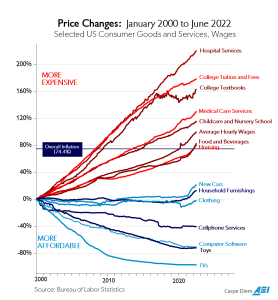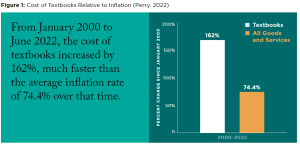It’s Not Just About the Money
When did textbooks get so expensive? Has it always been this way?
An article from Vox in 2019 outlines the history of textbooks, tracking the beginning of rising prices to the 1970s, around the same time that university tuition began to increase. Since then, textbook prices have risen over 1000%. Between 2006 and 2016, prices rose 88%, with students spending an average $1,200 per year on textbooks.
Obviously $1,200 is a whopping number to add on top of tuition, but the crucial issue is that the cost of course materials has skyrocketed past the rate of inflation. The Bureau of Labor Statistics and Mark J. Perry (2022) graph this discrepancy:


As tuition gets more expensive, so do textbooks, making college a practically insurmountable pile of costs. Students recognize that those profiting from this trend, publishing monopolies, will not do anything to make course materials more affordable. Instead, as outlined by a Vox article on textbooks, students have encouraged their educators to adopt and develop open source textbooks.
Still, shifting to open source materials requires a lot of work on behalf of teachers, who might just choose the easier, but more expensive, options to stay on top of their course planning. But many teachers know the value of accessible knowledge and are willing to put in the effort. The Vox article continues: “The rising cost of textbooks, then, is a sign of one of the greatest paradoxes of higher education: As everything from tuition to housing to books gets more expensive, the people who are tasked with making sure students receive a good education are being forced to do more work for less money.”
Is there a way to mitigate this dilemma? Benefitting rather than dumping more work on good teachers who care about their students?
Money is the driving cause of expensive textbooks and underpaid teachers, but the problem goes deeper than profit. It comes down to the devaluation of knowledge and learning alongside an increasingly exclusive college experience. Learning should not be a luxury and teachers should not have to choose between two evils.

